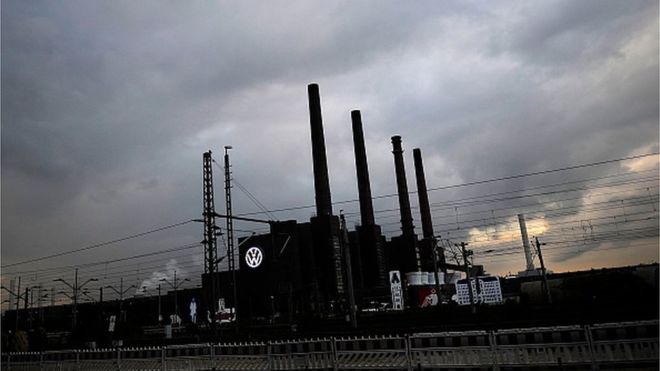October, 1, 2015

The city of Wolfsburg in Lower Saxony is not merely the hometown of Volkswagen. Wolfsburg is Volkswagen, Germany's answer to Detroit - but rather more prosperous.
It was founded in the 1930s as a place to house workers building the KdF-Wagen - the car which became the VW Beetle after the Second World War.
Even today, more than half of the town's 120,000 inhabitants work at the local VW plant, a sprawling complex that covers some 6.5 sq km. Many of the rest provide the services which those employees need, such as shops and restaurants.
It goes without saying that the VW logo is more than a little prominent here. It is the first thing you see when you arrive at the central station, looming over the platforms from the building opposite. It's on offices, car dealerships and pretty much every vehicle on the roads here.
So a crisis at Volkswagen is a crisis for Wolfsburg.
It threatens the entire social and economic fabric of this town. People here are reluctant to speak about the scandal in the United States, wary of showing disloyalty. But it is clear the events of the past week have taken a heavy toll.
"The people and the employees of Wolfsburg are extremely outraged about what has happened," says Hartwig Eng, a director of the trade union IG Metall.
"They've been working for Volkswagen for three or four generations and that's why they're so angry, and justifiably so."
Image copyright Getty Images Image caption VW in a downward spiral? Not necessarily, but fixing the mess is easier said than done
________________________________________
VW - the facts
• The Wolfsburg VW plant is the biggest car plant in the world
• VW has 12.9% of the world passenger car market
• The VW Group operates 119 production plants in 31 countries
• 592,586 VW employees worldwide produce nearly 41,000 vehicles every day
• VW vehicles are sold in 153 countries
________________________________________
Next steps
The question now for Volkswagen is of course: what happens next?
The company is facing potentially huge financial penalties in the United States, not to mention possible prosecutions and an avalanche of class action lawsuits. Enquiries are also taking place in several other countries. It's not yet clear whether the scandal will spread even wider.
Financially the consequences are unlikely to be very pretty. VW has already set aside €6.5bn (£4.7bn) to cover the costs of recalls, and pay for efforts to rebuild the brand. For a company which made a net profit of €10.8bn last year, that is not an insurmountable figure. However, the real total may end up being considerably higher.
Even so, the biggest cost may be to Volkswagen's reputation. The company has been caught deceiving not only regulators, but consumers as well. The "clean diesels" it sold in the US have been publicly exposed as nothing of the sort. So its reputation will have to be rebuilt.
This was a point highlighted by VW's vice chairman Berthold Huber at Wednesday's press conference.
"We are aware of the economic damage that we have suffered, but above that the damage to trust among Volkswagen customers that has occurred," he said.
"We have decided to make a clean break with that, and a fresh start."
________________________________________
New leader
Fixing the mess is likely to be easier said than done, and the resignation of chief executive Martin Winterkorn is likely to be just the start.
His departure was arguably necessary, because the deceptions in the US took place on his watch, whether he was aware of them or not - and his position was irrevocably damaged. However, the speed of his departure has left no time to line up a successor and ensure a smooth transition.
That makes it more likely that the new man will come from the Volkswagen stable, possibly taking the job on an interim basis. The clear favourite appears to be Mathias Mueller, who has been the chief executive of sister company Porsche since 2010.
However, other names are also in the frame. Among them are Hans Dieter Poetsch, the finance director who has been nominated as the firm's next chairman, Herbert Diess, currently the head of the VW car brand, and Rupert Stadler, the head of the Audi brand.
Whoever is appointed, his first priority will be to steady the ship. It is possible that a new long-term candidate could then be lined up to take over further down the line.
________________________________________
VW - the brands
VW owns 12 brands from seven European countries:
• Volkswagen Passenger Cars, Audi, SEAT, ŠKODA, Bentley, Bugatti, Lamborghini, Porsche, Ducati,
• Volkswagen Commercial Vehicles, Scania and MAN.
________________________________________
Detoxify
So will it be possible for VW to detoxify its brand? The simple answer is yes, but it's unlikely to be easy.
Five years ago, Japanese giant Toyota was in a similar position, pilloried by US regulators for failing to address known safety defects in its cars, which were linked to the deaths of dozens of people.
It responded with a concerted campaign to address the failings in its own organisation and rebuild consumer trust. While sales did fall in the short term, ultimately they recovered well.
The new chief executive at Volkswagen will be hoping to achieve something similar. The people of Wolfsburg will be hoping he succeeds, because the current crisis strikes at the very heart of this prosperous German city.
BBC
Video Story